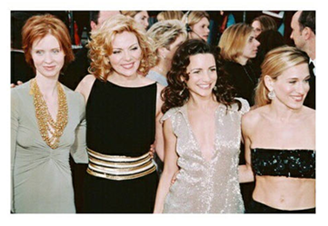I just saw it again – the “P” word. Promiscuity. And I saw it in an article written by a woman, referring to a period in her life when she was actively exploring her sexuality.
 I loathe the term “promiscuous;” it’s judgmental and gender-biased, implying engagement in indiscriminate sexual behavior with multiple people, and even the nature of the definition suggests that it is behavior that is inherently bad.
I loathe the term “promiscuous;” it’s judgmental and gender-biased, implying engagement in indiscriminate sexual behavior with multiple people, and even the nature of the definition suggests that it is behavior that is inherently bad.
Worse – we women use the “P” word, or an “S” equivalent, or accept their use when describing a woman who has had numerous sexual partners.
Men don’t refer themselves as promiscuous. And they don’t use derogatory terms when examining their sexual scorecard. Couldn’t women lead by example on this one, referring to periods of sexual diversity in other ways, and without any tinge of shame?
Dear old Mom
I remember my mother telling me (when I was in my twenties): Any woman who has slept with more than two men is promiscuous. On occasion, she would change the phrase to: Any woman who has slept with more than two men is a slut.
If I have a preference, I’ll take “slut” over “promiscuous” any day; it’s colloquial, even humorous at times, which doesn’t mean I’d like someone to hurl that label in my direction.
Still, promiscuous carries an air of dismissive disdain. Judgment. You know what I mean – as though some critical clinician has peered over his (or her) reading glasses, crumpled up his (or her) mouth, and pronounced said female specimen who has slept with two men, 22 men, or 102 men as little more than a tramp.
Tramp is camp
Yet tramp is camp, a term that makes me wistful. I picture Frank Sinatra and Rita Hayworth in Pal Joey, and I want to don a slinky dress, sidle up to a mike, and seduce a man with song… or at the very least, settle back in my Saturday morning comfort and comforter with a cuppa Joey, cruising cable for a classic film on TCM.
I admit I was both influenced by and amused at my mother’s remarks on the subjective subject of sexual partners. Apparently, despite telling me the only man she’d ever slept with was my father, she was cutting herself some slack. Was it “just in case” space, for one more man? Or might mid-century Mama have had a lover I never knew about?
At the time, my number was still in the single digits, and I assumed it would stay there. I’d meet a man, marry him, start a family, and pursue my dreams. Happily ever after, of course! It didn’t exactly happen that way, which leads us to the issue of numbers, and my contemporary cultural touchstone, still… Sex and the City.
Numbers (What’s your number?)
Doesn’t everyone learn life lessons and acceptable sexual mores from Sex and the City? I came late to that particular party, but found – even in my 40s – there was much to be absorbed from the antics of the fabulous four. And my experiences of sex and the single mom and sexual fantasy were at least on the same planet – even if only in my imagination!
 There’s an SATC episode in which the women discuss their “number.” I remember one crude (but funny) line directed at Charlotte: “You’ve had a fair amount of bone in you.” And best I recall, the number for each of the characters in the show was probably 60 on the low end, to literally thousands, on the part of Samantha.
There’s an SATC episode in which the women discuss their “number.” I remember one crude (but funny) line directed at Charlotte: “You’ve had a fair amount of bone in you.” And best I recall, the number for each of the characters in the show was probably 60 on the low end, to literally thousands, on the part of Samantha.
The episode was entertaining, but also thought-provoking; STDs and responsibility for one’s sexual health were part of the theme, as was the way women judge themselves on quantity (“I’m a whore,” Miranda says… ) while men take pride in naughty notches on the bedpost.
So?
- Do I think teens should dive into sexual activity without regard to their age, health, or emotional development? Of course not.
- Do I believe that men or women should disregard feelings, or responsible safety measures? Another no. But neither should we disregard the soothing, rejuvenating, loving, thrilling, and vital experience of sexual contact – booty calls and all!
- Should we promote sexual activity that runs into the thousands of partners? Or do we call that “promiscuity” and deem it bad?
I don’t think we should promote ANY sort of number, or judge it. Sexual expression is personal, and as long as it’s between consenting adults and handled responsibly, it’s no one’s business whether you’ve mated once for life or once a week with a different partner for the past 30 years – unless for some reason it is a cause of concern or dissatisfaction for you.
Language, numbers, and perception
 Honestly – who knows what the average number of sexual partners is — Google will reflect a Kinsey survey at four for women and seven for men — or you can try this age-sex-partner calculator, showing how you stack up against contemporaries, if you believe whatever assumptions may be built into its design, and if you acknowledge its clearly stated limitations.
Honestly – who knows what the average number of sexual partners is — Google will reflect a Kinsey survey at four for women and seven for men — or you can try this age-sex-partner calculator, showing how you stack up against contemporaries, if you believe whatever assumptions may be built into its design, and if you acknowledge its clearly stated limitations.
And not the least of these is the still prevalentbself-reporting bias that dogs both sexes.
Given the breadth and diversity of human experience, must we hold purselves to any rules of thumb other than using them as the interesting, if unreliable statistics?
But what does matter are words and how we use them. Especially when we’ve grown so accustomed to them that we no longer examine how they shade our perceptions, and not in a good way!
In this case, the words are used disparagingly and for only one demographic – women.
Other P words
In exchange for requesting that we voluntarily banish “promiscuity” and “promiscuous” from our vocabularies, I propose a few other “P” words to be used on a regular basis, when referring to our sexuality:
- protected
- passionate
- pleasurable
- plentiful
and very, very personal.
Sexuality is life affirming; when romance, love, or superb sex present themselves, let’s give them a round of applause, and enjoy this truly precious form of human expression.
You May Also Enjoy
I learned The 7 Ps when I was in the military. They were Poor Prior Preparation Produces Piss Poor Performance. It’s not completely relevant to your thesis here, but I thought it at least tangentially interesting 🙂
There was a time in my life that I was much more conservative than I am now. These days I like to think that I hold men and women to the same standard. That is that I would expect, like you say, for both men and women to have equal respect for their partners and for their own personal health and safety. The “number” isn’t really relevant unless it is way outside the norm which may indicate some social/mental problem. Some people use sex to cover some serious inner turmoil they are having. But, like with most things, that is not a blanket statement. All people have different reasons for doing what they do and there are very few of those reasons that are inherently better or worse than another.
I’m not concerned how many partners people have had as long as they aren’t crummy people. Men who notch their victories are as loathsome to me anything. I’m not that sort of person and I wouldn’t see why that attitude is necessary in men. I would be really pissed at my boys if they every displayed that sort of domineering attitude about women. They aren’t old enough, but I hope I can steer them right in that respect.
Excellent topic! Quite thought provoking. I wonder what others think about it.
I want a woman who is experienced: she has a number which is probably higher than one however experienced doesn’t necessarily mean a number; it means imagination. I want a woman who enjoys sex: she is liberated; she is not demure. She knows what she wants and she knows how to get it. I want a woman who is unfettered by society’s restraints: she doesn’t care about traditional pigeonholes; she wants to enjoy life to its fullest. I want a woman who is unafraid to enjoy a man as much as I enjoy a woman.
Promiscuous in our society has a negative connotation and the so-called behaviour it designates is interpreted in a negative light. The word slut is even worse and once again paints the picture of an undesirable. However, from my first paragraph, that is exactly the type of woman I’m looking for. I am convinced this is exactly the type of woman any man would want. Unfortunately, we all live in a society which has not yet come to grips with its traditional role models and its puritanical approach to one of the most beautiful experiences two people can have together. It is beyond odd to consider that the powers that be censor sex on television but allow murder. (Carnography: Vegetarians need not apply) The average child will watch 8,000 murders on TV before finishing elementary school. By age eighteen, the average American has seen 200,000 acts of violence on TV, including 40,000 murders.
How bad is this? George Carlin in his comic routine “Seven Words You Can’t Say On Television” touched on how society and our censorship looks unkindly at things sexual but seems to have no problem with violence. ( Censorship: Kill me but no sex please)
I think the word F**k is a very important word. It is the beginning of life, yet it is a word we use to hurt one another quite often. People much wiser than I am said, “I’d rather have my son watch a film with 2 people making love than 2 people trying to kill one another. I, of course, can agree. It is a great sentence. I wish I knew who said it first. I agree with that but I like to take it a step further. I’d like to substitute the word F**k for the word Kill in all of those movie clichés we grew up with. [Carlin speaks in a low menacing voice like the bad guy talking to the good guy] “Okay, Sheriff, we’re gonna F**k you now, but we’re gonna F**k you slow.”
Good gravy, are we hung up about sex or what?
So, to return to the perils of the “P” word (or, for that matter, the “S” word), Ms. Wolf has some good alternatives in protected, pleasurable, plentiful and personal. I consider it a shame that society takes some sort of moral high road about something as beautiful as sex. Life is short; eat dessert first. Be nice. Be kind. We’re all in this together.
As you point out, William – there is a striking (and hypocritical) contrast between the violence that our children will see on TV while we continue to bleep certain words. I wonder how long before we yield the yoke of our puritanical beginnings, realizing that it isn’t the end (or beginning of the end) of morality, but possibly a more natural and inclusive one.